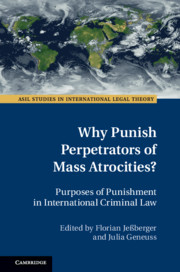Book contents
- Why Punish Perpetrators of Mass Atrocities?
- ASIL Studies in International Legal Theory
- Why Punish Perpetrators of Mass Atrocities?
- Copyright page
- Contents
- Contributors
- Preface
- Abbreviations
- 1 Introduction: The Need for a Robust and Consistent Theory of International Punishment
- 2 The Practical Importance of Theories of Punishment in International Criminal Law
- Part I Setting the Framework: Criminological, Historical and Domestic Perspectives
- 3 Criminology of International Crimes
- 4 Punishment Rationales in International Criminal Jurisprudence
- 5 Punishment and the Domestic Analogy
- 6 Not Much, but Better than Nothing – Purposes of Punishment in International Criminal Law
- 7 The Why Question in International Criminal Punishment – Framing the Landscapes of Asking
- 8 Is International Criminal Law Special?
- Part II Rationales for Punishment in International Criminal Law: Theoretical Perspectives
- Part III Consequences for the Practice of the International Criminal Court
- Select Bibliography
- Index
4 - Punishment Rationales in International Criminal Jurisprudence
Two Readings of a Non-question
from Part I - Setting the Framework: Criminological, Historical and Domestic Perspectives
Published online by Cambridge University Press: 07 February 2020
- Why Punish Perpetrators of Mass Atrocities?
- ASIL Studies in International Legal Theory
- Why Punish Perpetrators of Mass Atrocities?
- Copyright page
- Contents
- Contributors
- Preface
- Abbreviations
- 1 Introduction: The Need for a Robust and Consistent Theory of International Punishment
- 2 The Practical Importance of Theories of Punishment in International Criminal Law
- Part I Setting the Framework: Criminological, Historical and Domestic Perspectives
- 3 Criminology of International Crimes
- 4 Punishment Rationales in International Criminal Jurisprudence
- 5 Punishment and the Domestic Analogy
- 6 Not Much, but Better than Nothing – Purposes of Punishment in International Criminal Law
- 7 The Why Question in International Criminal Punishment – Framing the Landscapes of Asking
- 8 Is International Criminal Law Special?
- Part II Rationales for Punishment in International Criminal Law: Theoretical Perspectives
- Part III Consequences for the Practice of the International Criminal Court
- Select Bibliography
- Index
Summary
Sergey Vasiliev undertakes a thorough analysis of international criminal tribunals’ statements on theories of punishment. Vasiliev concludes that courts’ statements display ‘ritualism’ and ‘monotony’, and that due to their ‘hypnotioc repetition’ are of limited practical value. While deterrence and retribution can be identified as the main objectives referred to by judges, the underlying principles and rationales are taken from domestic criminal law doctrine, without ever questioning their suitability in the context of international criminal law. The contents of these goals and objectives, however, are coloured with a reference to the goals set for the establishment of international criminal justice institutions as such. As a result of his analysis, Vasiliev comes to the conclusion that the few statements on theories of punishment by international courts and tribunals are mere speech acts, ‘by which courts preach to international criminal law’s founding articles of faith’. They say that they punish for retribution and deterrence, but in reality the main purpse of punishment is related to expressivism and didactics. In his view, expressivism emerged as kind of the ‘ultimate catch-all objective’ and ‘meta justification’ for punishment, in order to reproduce and reinforce the normative belief system upon which the enterprise of international criminal prosecution rests.
Keywords
- Type
- Chapter
- Information
- Why Punish Perpetrators of Mass Atrocities?Purposes of Punishment in International Criminal Law, pp. 45 - 80Publisher: Cambridge University PressPrint publication year: 2020
- 1
- Cited by

